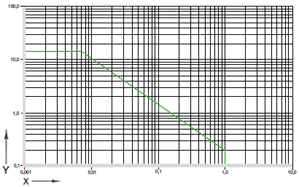iglidur® UW160 was developed quite specifically with regard to maximum wear resistance in media-based continuous operation. In such applications, low radial loads and moderate temperatures occur as a rule. The property profile is rounded out by its suitability for potable water contact and superior media resistance.
iglidur® UW160 - material data
| Genera l features | Unit | iglidur® UW160 | test method |
| Density | g/cm³ | 1,04 | |
| Colour | Gray | ||
| Max. humidity absorption at 23°C/50% R. H. | % weight | 0,1 | DIN 53495 |
| Max. water absorption | % weight | 0,1 | |
| Coefficient of surface friction, dynamic, against steel | µ | 0,17 - 0,31 | |
| pv values (dry) | MPa x m/s | 0,22 | |
Mechanical properties |
|||
| Bending E-module | MPa | 1.349 | DIN 53457 |
| Tensile strength at +20 °C | MPa | 22 | DIN 53452 |
| compressive strength | MPa | 32 | |
| Maximum recommended surface pressure (20° C) | MPa | 15 | |
| Shore D-hardness | 60 | DIN 53505 | |
Physical and thermal properties |
|||
| Max. long term application temperature | °C | +90 | |
| Max. short term application temperature | °C | +100 | |
| Minimum application temperature | °C | -50 | |
| thermal / heat conductivity | [W/m x K] | 0,50 | ASTM C 177 |
| Coefficient of thermal expansion (at 23° C) | [K-1 x 10-5] | 18 | DIN 53752 |
Electrical properties |
|||
| Specific forward resistance | Ωcm | >1012 | DIN IEC 93 |
| surface resistance | Ω | > 1012 | DIN 53482 |
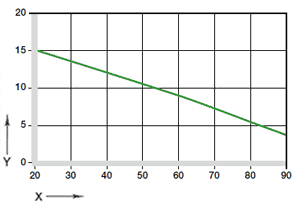
Figure 02: Maximum recommended surface pressure dependent on the temperature (15 MPa to +20 °C)
X = Temperature [°C]
Y = Load [MPa]
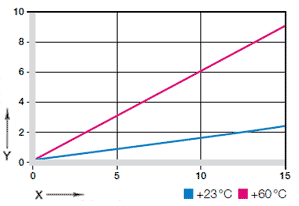
Figure 03: Deformation under load and temperatures
X = Load [MPa]
Y = Deformatio [%]
The pressure resistance of iglidur® UW160 bearings declines with increasing temperatures. Fig. 02 clarifies this connection. Maximum recommended surface pressure represents a mechanical material parameter. Tribological conclusions cannot be drawn from it.
Figure 03 shows how iglidur® UW160 elastically deforms under radial load.
| m/s | Rotary | oscillating | Linear |
| Constant | 0,3 | 0,3 | 1 |
| Short-term | 0,5 | 0,4 | 2,5 |
The maximum permissible surface speed is determined by the resulting frictional heat at the bearing point. The temperature should only be permitted to increase to a value that will ensure a purposeful use of the bearing with respect to wear and dimensional integrity. The maximum values indicated in Table 02 apply to dry-running conditions. Depending on the installation situation in connection with reduced heat generation, partially higher speeds can be obtained in media immersed applications.
| iglidur® UW160 | Application temperature |
| Lower | - 50 °C |
| Upper, long-term | + 90 °C |
| Upper, short-term | + 100 °C |
| Secure axially in addition | + 70 °C |
iglidur® UW160 was developed for use in liquid media in the normal and medium temperature ranges. Like in all thermoplastics, the compressive strength of iglidur® UW160 declines as the temperature rises. The temperatures prevailing in the bearing system also have an influence on the bearing wear. The wear rises with increasing temperatures. An additional securing is recommended at temperatures higher than +70°C.
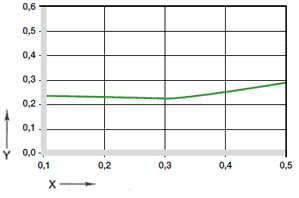
Figure 04: Coefficients of friction dependent on the surface speed, p = 0,75 MPa
X = Sliding speed [m/s]
Y = Coefficient of friction μ
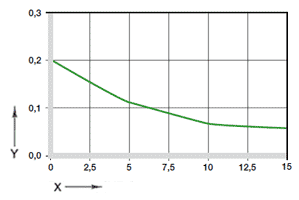
Figure 05: Coefficients of friction dependent on the load, v = 0,01 m/s
X = Load [MPa]
Y = Coefficient of friction μ
Coefficient of friction and wear alter with the application parameters. The influence of surface speed and surface finish of the shaft on the friction coefficient is low, but with increasing radial load the coefficient of friction decreases significantly, mainly in the range of up to 7.5 MPa.
| iglidur® UW160 | Dry | Grease | Oil | Water |
| Coefficients of friction µ | 0,17 - 0,31 | 0,08 | 0,03 | 0,03 |
Table 04: Coefficients of friction against steel (Ra = 1 µm, 50 HRC)
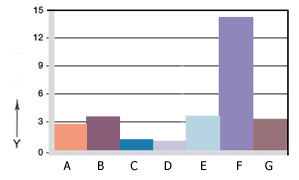
Figure 06: Wear, rotating application with different shaft materials, p = 1 MPa, v = 0,3 m/s
X = Shaft material
Y = Wear [μm/km]
A = Aluminum, hard-anodized
B = machining steel
C = Cf53
D = Cf53, hard chrome-plated
E = St37
F = V2A
G = X90
Figure 06 shows an excerpt of the results of tests with different shaft materials, conducted in dry-running operation with bearings made of iglidur® UW160. Using the example of a rotating motion with a radial load of 1 MPa and a speed of 0.3 m/s, it becomes apparent that iglidur® UW160 attains good wear results across a variety of shaft types except for when paired with V2A shafts. It is also clear that there are other iglidur® materials that are more suited to dry-running operation. As with several other iglidur® materials in dry-running operations, Fig. 07 shows that, with all other parameters the same, the wear is far greater with rotation than with pivoting.
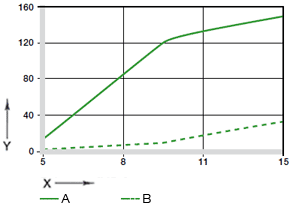
Fig. 07: Wear with oscillating and rotating applications with Cf53 as a function of the load
X = Load [MPa]
Y = Wear [μm/km]
A = Rotating | B = Oscillating
| Medium | Resistance |
| Alcohols | + |
| Hydrocarbons | + |
| Greases, oils without additives | + |
| Fuels | + to 0 |
| Diluted acids | + |
| Strong acids | + |
| Diluted bases | + |
| Strong bases | + |
All specifications at room temperature[+20 °C]
Table 05: resistant to chemicals
Electrical properties
| Specific forward resistance | > 1012 Ωcm |
| surface resistance | > 1012 Ω |
iglidur® UW160 plain bearings have superior resistance to chemicals. Most organic and inorganic acids, as well as alkalis and lubricants do not attack iglidur® UW160.
iglidur® UW160 bearings are radiation resistant up to a radioactive intensity of 3 · 102 Gy.
igubal® UW160 bearings are only conditionally resistant to UV rays.
In application in vacuum, the potentially existent moisture content is degassed. For this reason only the dry iglidur® UW160 bearings are suitable for vacuum.
| Maximum moisture absorption | |
|---|---|
| by +23 °C/50 % r. F. | 0,1 Wt.-% |
| Max. water absorption | 0,1 Wt.-% |
The humidity absorption of iglidur® UW160 bearings amounts to about 0,1 Wt.-% in standard climatic conditions. The saturation limit in water is likewise only at 0.1%.
| Diameter d1 [mm] |
Shaft h9 [mm] |
iglidur® UW160 E10 [mm] |
Housing H7 [mm] |
| Up to 3 | 0 - 0,025 | +0,014 +0,054 | 0 +0,010 |
| > 3 bis 6 | 0 - 0,030 | +0,020 +0,068 | 0 +0,012 |
| > 6 bis 10 | 0 - 0,036 | +0,025 +0,083 | 0 +0,015 |
| > 10 bis 18 | 0 - 0,043 | +0,032 +0,102 | 0 +0,018 |
| > 18 bis 30 | 0 - 0,052 | +0,040 +0,124 | 0 +0,021 |
| > 30 bis 50 | 0 - 0,062 | +0,050 +0,150 | 0 +0,025 |
| > 50 bis 80 | 0 - 0,074 | +0,060 +0,180 | 0 +0,030 |
| > 80 bis 120 | 0 - 0,087 | +0,072 +0,212 | 0 +0,035 |
| > 120 bis 180 | 0 - 0,100 | +0,085 +0,245 | 0 +0,040 |
Table 07: Important tolerances for iglidur®{SBA} bearings according to ISO 3547-1 after the press-in.
iglidur® UW160- bearings are standard bearings for shafts with h-tolerance (recommended minimum h9). The bearings are designed for press-fit in a housing with h7 tolerance. After the installation in a housing with nominal diameter, the inner diameter of the bearing automatically adjusts to the E10 tolerance.
More than 100,000 products available! Delivery and consultation Mon-Fri from 7am-8pm and Sat from 8am-12pm!
